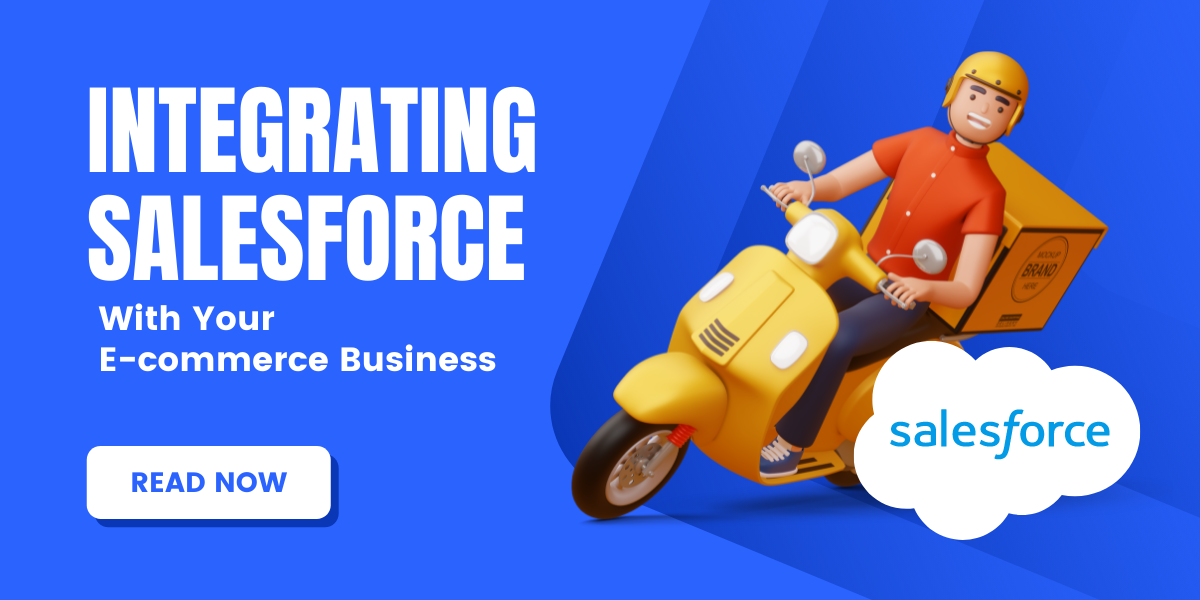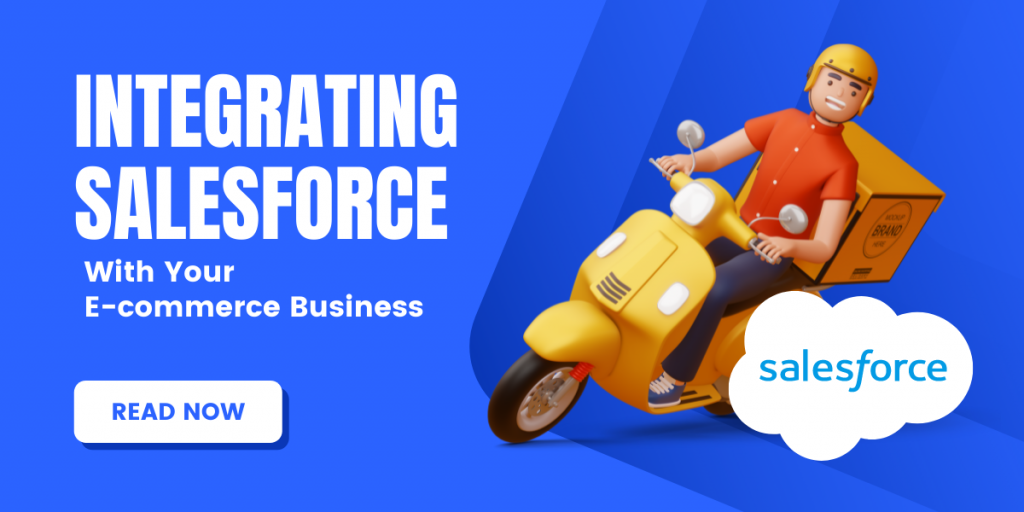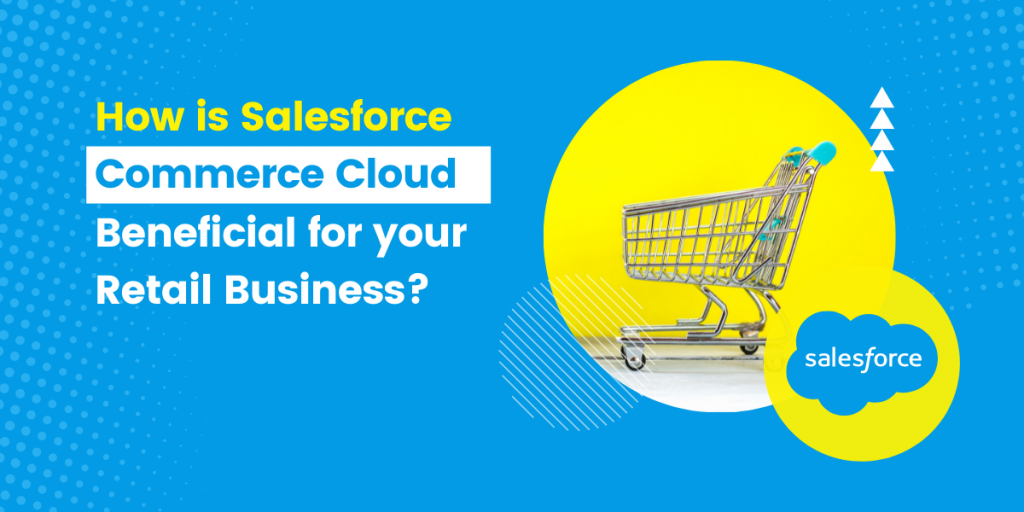Benefits of Integrating Salesforce with your Ecommerce Business

Ecommerce customers across B2B and B2C industries demand a connected and unified shopping experience. This also means that they want seamless handoffs between different channels and websites, along with personalized engagements based on previous interactions that happen with a brand.
Most customers feel that these connected processes are important when it comes to choosing a business in the competitive eCommerce landscape. Therefore, all businesses that are hoping to attract the present connected shoppers must unify experiences across all the touchpoints. With Salesforce integration, customers can get a truly cohesive retail experience along their journeys from discovery to delivery and what lies beyond.
A unified customer experience can also provide brands with a clear understanding of customer activity and how it may relate to retail inventory, products, and promotions. Any e-commerce platform that supports excellent user experience design can make the online store of a brand easy to navigate and explore.
The product recommendations and smart search powered by artificial intelligence can inspire millions of shoppers to purchase. Brands can also maximize their conversion rates with e-commerce optimizations such as checkouts without the need for an account sign-up requirement and automated price adjustments for sales and promotions which eliminates sticker shock at checkout.
Salesforce Makes E-commerce Integration Simple
Things are changing quickly in the retail world and the way in which a brand embraces this evolving landscape and connects with today’s customers starts with e-commerce integration. Modern shoppers expect to buy anywhere and fulfill anywhere experience along with an ability to interact with a brand on any channel.
Businesses should look for a way that enables the customers to engage seamlessly as they move across their preferred channels including, social, mobile, and in person. For delivering this kind of customer experience, an online e-commerce business should be integrated with marketing, fulfillment, inventory management, and back-end accounting systems. Most of the legacy commerce platforms cannot handle this kind of e-commerce integration.
The traditional systems were not really designed for a retail online integration nor can they keep up with the pace of innovation that is needed to stay competitive. This is why omnichannel solutions such as e-commerce integration are making innovation easy and many retailers are turning to Salesforce.
The Salesforce Commerce Cloud provides both B2B and B2C businesses a world-class platform for e-commerce integration. It has a cloud-based and multi-tenant architecture that delivers scalable, reliable, and security-based systems that merchants need for competing in a quickly changing retail environment. The Commerce Cloud enables to unify buying experiences all across channels while streamlining all operations from discovery and purchase to fulfillment and beyond. Using the Commerce Cloud, it becomes easy to integrate e-commerce behind the scenes with unified information across stores, interactions, customers, orders, products, inventory, pricing, etc. This easy e-commerce integration also connects in-store mobile channels and enables them to leverage core e-commerce capabilities and services such as transaction management and merchandising.
With true e-commerce integration, retailers can stay connected to customers anywhere they shop and innovate across the entire customer experience quickly without any problems. The capability of Salesforce for e-commerce integration combines digital commerce, store operations, order management, and AI-powered personalization into a single and unified commerce platform. With Salesforce, e-commerce businesses can do the following things.
- They can deliver a strategic and personalized shopping experience at each step and on any device.
- Businesses can roll out continuous innovations with any kind of dependencies, disruptions, and delays.
- Businesses can launch new websites in weeks and new promotions within minutes.
- Salesforce makes it possible to unify digital commerce with store operations, order management, and more.
- It becomes possible to offload IT operations for a unified cloud that is scalable, robust, and stable.
- Salesforce helps in maximizing productivity with centralized site management and automated tasks.
- It is possible to explore new regions easily and go global in record time.
Retail Operation Standards
A business must run its retail e-commerce platform with the care and attention that is demanded by a flagship retail location. Online stores have become the primary way in which customers interact with a brand while becoming the new storefront window display. Just as it is with a storefront window display, e-commerce businesses must showcase new products regularly.
Most customers expect to see new merchandise anytime they visit a site of a store. Everyday inventory updates are a must as today’s customers crave fresh product offerings more frequently than ever before. With an intelligent e-commerce platform, businesses can aggregate average customer visit frequency and stagger product launches for meeting the pace of high-value shoppers.
Business owners have to understand that e-commerce is essentially a competition between businesses and it is important for brands to understand what the competition offers and charges. Using automation to run reports on the competition helps businesses to develop compelling deals, counteroffers, and bundles for their customers with state-of-the-art website experiences that stand out and do not just blend in.
Businesses should always remember that great online customer service is equally important as a perfectly presented product inventory or an online e-commerce business website. Just as in physical retail stores when customers run into issues such as shopping online, businesses should be there for kindness and support. Real-time messaging built into an e-commerce website is an indispensable tool that brands can use for engaging with customers and solving their problems including bounce rates, shopping cart abandonment, and shopper dissatisfaction.
Omni Channel Marketing

Most modern customers are comfortable with receiving relevant and personalized advertising messages from digital channels. This is valid on the web, email, and social media. Businesses can help deliver an easy shopping experience to these customers by integrating e-commerce with digital marketing.
Offering connected experiences to the customers is considered important across every channel and brands must take care while integrating shopping links into personalized web ads, emails, and social content used in digital marketing campaigns. Micro-targeted omnichannel marketing enables brands to choose the highest value e-commerce customers and other desired niche markets that deliver content to those who are most likely to click and convert.
The Shop sections can also be added to brand profiles on important social media websites such as Facebook. From here, it becomes easy to tag products from the brand’s shop in image and video posts. The content of Stories on Instagram and Snapchat can also be linked to a brand’s retail e-commerce platform leading to the seamless customer journey and omnichannel conversions.
Driving Sales

The Commerce Cloud is a cloud-based e-commerce platform that is powered by innovative technology that helps in connecting businesses and customers in a way that is never done before. It is immensely scalable and it can adapt to suit the needs of B2C and B2B sellers of any shape, size, and scope.
Commerce Cloud features Einstein Artificial Intelligence which helps the brands to inspire and convert e-commerce customers with highly personalized journeys while seamlessly connecting all channels. For ensuring mobile e-commerce success, a responsive mobile design, optimized micropayments, and one-touch payments are all built into the platform.
Artificial Intelligence
The use of Salesforce Commerce Cloud enables the customers to get personal recommendations in a way that they can tailor the shopping experience to each use with Einstein product recommendations that deliver highly personalized product suggestions with all clicks. Businesses can drive revenue using the customer insights using the internet purchasing behavior and optimizing the product bundles, sets, and deals with Einstein Commerce insights which is an AI-powered shopping basket analysis dashboard.
You can use customer data to power personalization across any channel including mobile applications with Einstein Recommendations API. In addition, the conversions can be boosted with intelligent search results by helping the shoppers find what they are looking for and more with Einstein Predictive Sort which automatically tailors category pages and search results to each shopper. The Salesforce Commerce Cloud improves searches with type-ahead guidance. The abandoned searches can be reduced with Einstein Search Recommendations which offers type-ahead suggestions personalized to every shopper in real-time.
Innovative Customer Experiences
The Salesforce integration enables the creation of unified customer journeys across all core functions with the Salesforce platform that connects Commerce Cloud with sales, service, marketing, and more. The API first commerce helps in building and extending shopping experiences using the Open Commerce APIs that surface core B2C e-commerce functionality for developers and third-party applications.
New revenue channels can be unlocked with scalable APIs because headless commerce allows you to mix and match composable capabilities for meeting the business needs. The operations can be launched quickly and the total cost of ownership while delivering agile and innovative customer experiences can also be reduced.
Salesforce helps in extending, customizing, and innovating the sites in a way that the shopping experience can be enhanced with an extensive library with certified integrations, ratings and reviews, payment accelerators, and loyalty programs. There are developer-friendly tools that help in coding as well by responding to business requests and delivering innovation quickly using a dev environment that provides industry standard and JavaScript-based tools.
Salesforce also helps in developing mobile commerce applications using scalable APIs, technology patterns, full development framework, etc. Lastly, the time to market can be accelerated with industry-specific solutions and apps prebuilt for common use cases.
Scalability in Business

The Salesforce Commerce Cloud offers a great deal of scalability in business. You can go global in record time while minimizing the risk, cost, and technical complexity of entering new international markets with borderless infrastructure, and safe interactions. It is easy to quickly customize websites for accounting customs, cultures, languages, and currencies. You can give localized reference architecture for English, Japanese, French, Japanese, etc.
Salesforce also helps in the easy execution of global content strategies. It is easy to build great digital commerce experiences with targeted content, offers, and relevant products that are organized by language, region, city, or country. In addition, it is also possible to manage multiple sites and regions easily because you are able to launch and manage all the B2C e-commerce properties include brands, sites, devices, and geographies from a single and unified framework.
Seamless Customer Experience

The Salesforce integration enables optimization of conversion funnel while reducing abandoned carts with proven best practices including save carts, payment accelerators, and optimized checkout flows. You can also go mobile with the Master mobile commerce and a full suite of mobile-first capabilities including responsive design, one-touch payment, and a data-driven mobile UX.
Salesforce helps in leveraging social extensions by extending your reach and merging digital commerce with social channels and online communities such as Facebook and Instagram. It is possible to empower customer service teams by helping service agents accelerate over-the-phone orders and check out on behalf of customers with real-time access to digital storefronts and order history. You can connect digital commerce in the store and enable mobile access to digital inventory that store associates can offer to sell and ship in real-time anywhere in the store with a flexible add-on called Commerce Cloud Endless Aisle.
The Salesforce Commerce Cloud manages the complete order lifecycle while connecting commerce and service experiences, unifying customer profiles, and unlocking order history with an add-on called Salesforce Order Management. It becomes makes orders and payments so that customer value and loyalty can be increased with seamless interactions with the customer journey. The integrations can be simplified and commerce payments can be embedded quickly and easily for a better shopping experience.
Conclusion
Salesforce assists the entire customer journeys across commerce including sales, marketing, customer service, communities, and more. It is one of the top-ranking customer relationship management systems in the globe that is home to trailblazing customers, expert partners, and software platforms including Service Cloud, Marketing Cloud, and Sales Cloud all of which integrates with Commerce Cloud to power the entire customer lifecycle from awareness to purchase and retention.
Hence, e-commerce businesses must unify their customer journey with agility, authenticity, and scalability. With the integration of Salesforce, businesses can unlock revenue across channels with customizable commerce experiences.
Benefits of Integrating Salesforce with your Ecommerce Business Read More »
Salesforce






